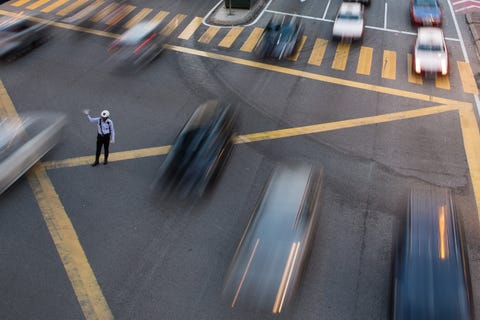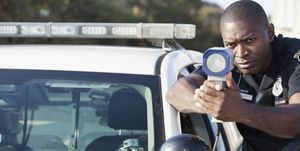
@ Didier MartiGetty Images
- Police agencies around the country are limiting their interactions with the public to reduce the spread of coronavirus.
- One Michigan police officer said his department’s approach amounts to: “Don’t pull anyone over unless you have to.”
- Police agencies reiterated that they are still enforcing traffic laws while acknowledging that the individual officers can use discretion about when to make a traffic stop.
To limit the spread of coronavirus, some police officers are practicing social distancing by reducing the number of traffic stops they make. One Michigan police officer told Car and Driver his department’s approach to minimizing the spread of COVID-19 could be described as: “Don’t pull anyone over unless you have to.” Another municipal police officer in suburban Detroit reported that his department isn’t making any misdemeanor arrests. He explained that the department hopes to reduce caseloads in the courts.
Officially, police departments are telling a slightly different story. “We’re going to continue to conduct criminal investigations, enforce New Jersey traffic laws, and investigate motor vehicle crashes,” said sergeant Jeff Flynn of the New Jersey State Police. “We have encouraged troopers to limit contact with people. If a trooper can make a phone call as opposed to speaking with someone in person, we’re recommending that they do that.”
Shannon Banner, public affairs manager for the Michigan State Police, said: “Traffic safety remains a priority of the Michigan State Police, and troopers have discretion when it comes to traffic enforcement. As of this time, the MSP has not made any changes to its service delivery, but this is a fluid situation and we will make adjustments if they are needed and are in the best interest of public safety and ensuring the health of our employees.”
Banner’s statement underscores the big question police departments around the country are grappling with at the moment: What’s a bigger public safety threat, a driver violating a traffic law or spreading a deadly virus that threatens to overwhelm America’s health-care system?
As one possible answer to that question, consider that 9378 people were killed in speeding-related traffic crashes in the U.S. in 2018, according to the National Highway Traffic Safety Administration (NHTSA). Recent data on COVID-19 suggests the virus has a 1.4 percent fatality rate among people who contract the disease. If the virus were to infect 80 percent of the U.S. population and that fatality rate proved accurate, the toll could reach as high as 3.7 million people.
While the virus will spread regardless of whether or not officers reduce the number of traffic stops they make, police forces are also trying to minimize the number of their own ranks sidelined by the virus. Police stations around the country have closed their doors to the public for nonemergency business to minimize that risk. Routine processes such as firearm registration, witness interviews, and fingerprinting are now being conducted online, handled by mail or phone, or have been suspended for the time being. Cities such as Denver; Portland, Oregon; and Syracuse, New York, have announced plans to reduce in-person police response for nonviolent crimes and crimes not currently in progress. Instead, officers will take reports online or over the phone.
Regulations Are Changing, Too
It’s not just enforcement that’s changing. The laws and regulations themselves are also being altered to contain the contagious virus, to hasten the emergency response, and in recognition that, for many Americans, life’s routines have changed significantly in the past week. The California Department of Motor Vehicles has asked the state’s law enforcement agencies to grant a 60-day grace period to anyone driving with an expired license as residents are advised to avoid public spaces. The federal agency that oversees the trucking industry has suspended time limits on driving hours for truckers delivering medical equipment, food, and sanitation supplies. Michigan governor Gretchen Whitmer lifted weight limits on all the state’s roads for trucks delivering crucial supplies. And in a nod to the many citizens suddenly working from home, Los Angeles and New York City have relaxed enforcement of alternate-side parking policies used to clear roads for regular street cleaning.
Source: Motor - aranddriver.com






